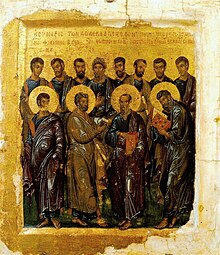Jethro Bodine
Member
- Oct 31, 2011
- 23,344
- 5,951
In Jethro's church, we talk about it, which includes hearing all sides of it, and we say 'I don't know' when that's the case (including the pastor), and we respect everyone's input into the discussion. The reason this won't erupt into chaos is because the pastor and elders have made it very clear the church exists to raise God's people up into the image of Christ, not raise up 'doctrinal' Christians who think the epitome of being a Christian is knowing and vehemently defending doctrinal positions, as if believing in correct doctrine is the 'believing' that God requires and is pleased with.You may believe God punished Jesus on the cross.... and I believe God rescued Him from the consequences He chose to accept on our behalf. Which is "THE" truth?
Exactly! That's why I am against the Bible studies many churches have during the week.....the pastor is not in attendance, and sometimes not even an elder.the flock has to be guarded strange fire (doctrine) can get carried away. that is where a good leader that knows the word . would have to step in in it got out of control.
In Jethro's church (meaning the open church he attends) the one who wants to make sure that no one believes what he doesn't believe will find he has no place in the congregation because we're about actually experiencing and living for God and being changed people according to the fruit of the Spirit. He'll soon realize how out of place he is. Doctrinal Christians will be very disappointed with our meetings. And that's a good thing. We would want them to leave.some churches you mention eternal security .is like waving a staek in front of Dog and expecting him to ignore it.
Great topic for discussion.i am having a hard time understanding what many considers having a church service one said they would like a building and a retired pastor who was not after money.. i am not retired i have pastor 2 different Churches for FREE well they wanted give me the offering maybe 35.00 max once a month. i have done more preaching for free than i have paid... might i add it is Bible to pay the pastor . i am really confused as to many look for or think a church should be?
Don't have time to explain the details, but the point is, an effective size of a church is 20 to 40, maybe 60 people. But if you hire a pastor who's $100,000.00 in student loan debt, has two car payments, a mortgage, and expects to have benefits including retirement, well, for one, he's already quite different monetarily than most if not all of his congregation, and two, it will be a burden to support those kinds of financial requirements for a pastor.
I only mentioned a retired pastor because at this time in church history that would be the best answer to the $$ problem.
What's wrong with that? It's counter productive, even dangerous, to keep people who don't like your church around. In the open church I attend (in my dreams, lol) we'll provide the trampoline for the disgruntled, unsatisfied person to take a giant leap right out the front door. It never ends good when unhappy congregants hang around in silent anger waiting for an opportunity to explode in the hope of changing things to what they want. If churches stopped trying to hang on to unhappy congregants perhaps the only split they'd ever have is that one person leaving instead of them being allowed to fester among the people and end up dragging half the congregation off with him when he finally does leave.but then we have the church jumpers they stay at one church for a while .till they find another perfect Church and they soon realize its not ..mainly because they are there lol i call them spiritual church jumpers.
Don't have time to go into detail, but the truth is, the open church is the pastor's church, not the congregations. His success or failure depends on whether he does, or doesn't do, the right things he's supposed to be doing. It's God's way of keeping his pastors and elders in line with the truth. But if it's the congregation's church it will be a chaotic mess, everyone vying for power in the group.











